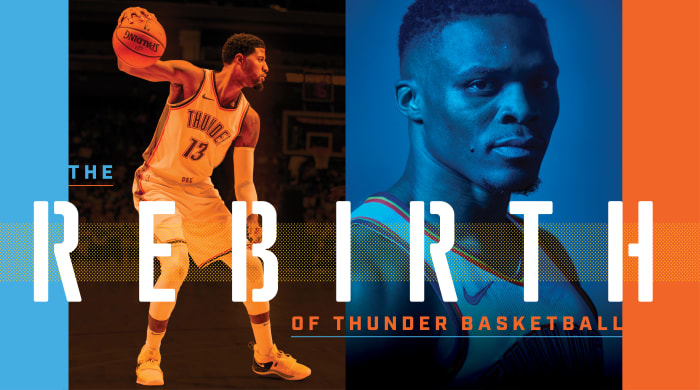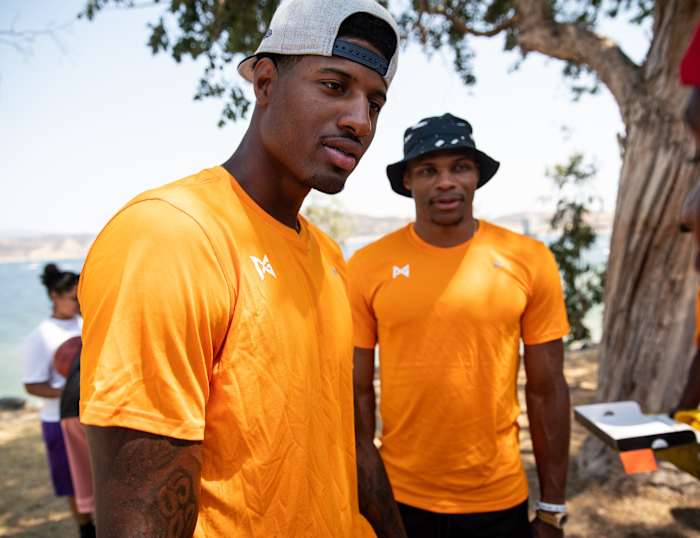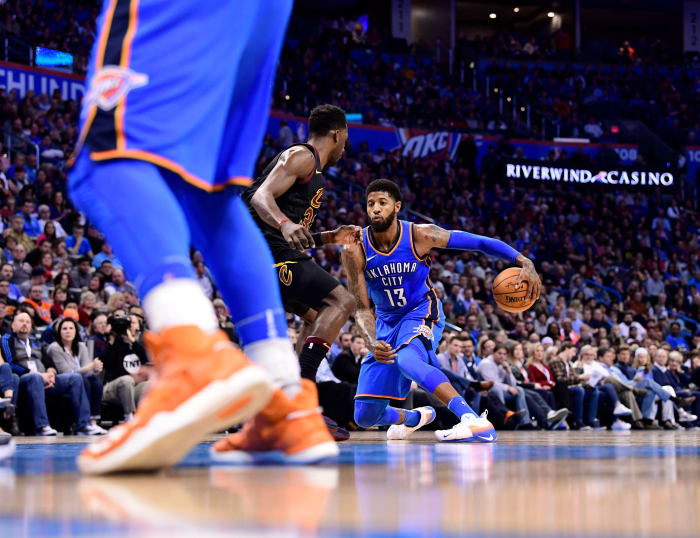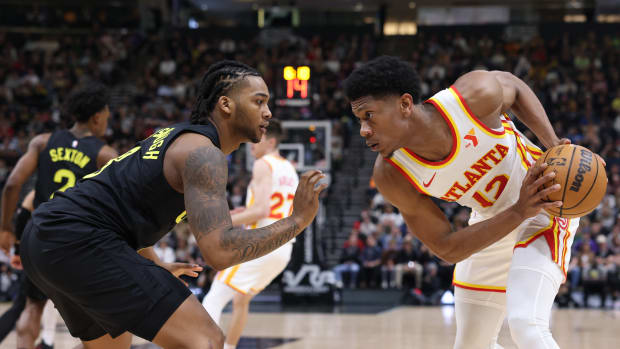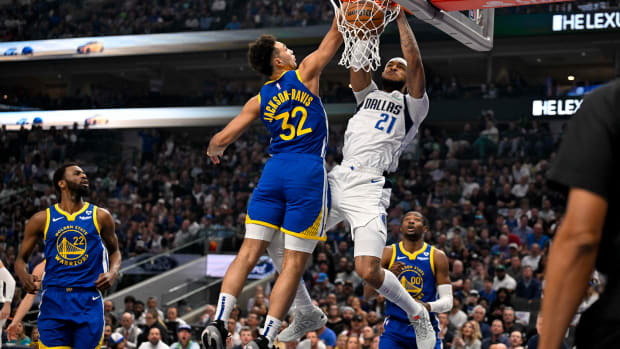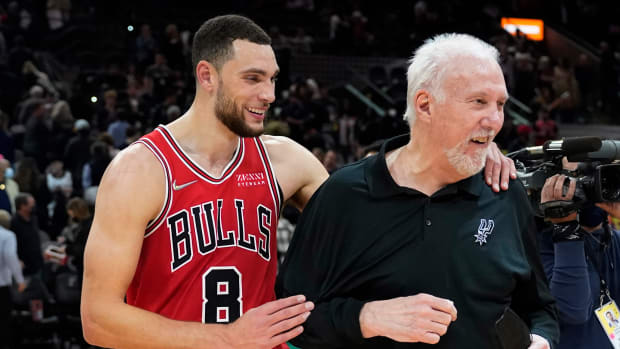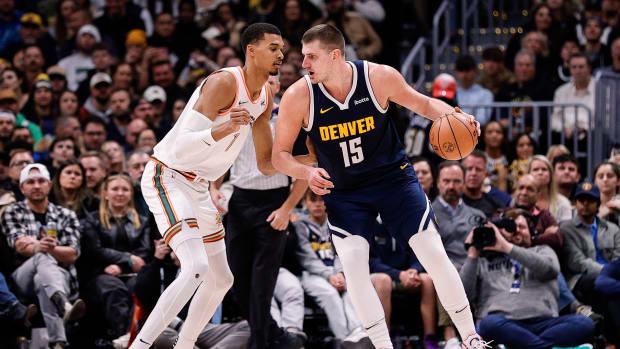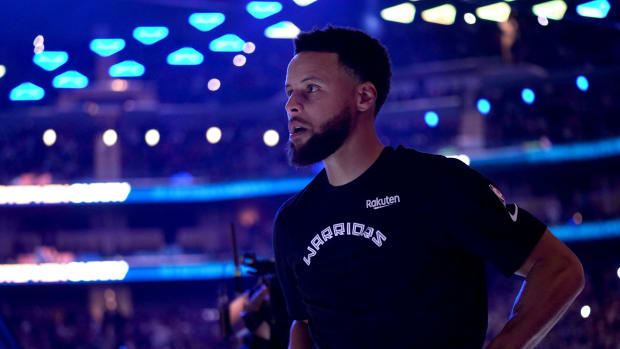The Rebirth of Thunder Basketball: A Bond Between Stars Provides New Hope in OKC
This story appears in the October 22, 2018, issue of Sports Illustrated. For more great storytelling and in-depth analysis, subscribe to the magazine—and get up to 94% off the cover price. Click here for more.
Before Paul George could register what had happened, he was greeted on his phone by the toothy grin of Russell Westbrook. A trade had made them teammates—shocking the league and George, too. The idea of playing in Oklahoma City had never occurred to him. Cleveland, maybe, though talks between the Pacers and the Cavs had stalled. Other contending teams were wary. The only reason George was available was that his agent had informed the Pacers of his intention to leave the team in free agency the following summer, in 2018. Executives around the NBA assumed that George, a Southern California native, was angling his way to the Lakers at the first opportunity.
They were right.
“I wanted to go back home,” George says. Home meant Palmdale, which meant Los Angeles, which meant the team of his basketball idol, Kobe Bryant. George dreamed in purple and gold, but he was reasonable enough to consider his alternatives. “If that didn’t work,” he adds, “I absolutely wouldn’t have minded playing for the Clippers.”
Will LeBron James’s Lakers Be Anything More Than a Spectacle?
The Thunder were never part of the plan. Yet here was Westbrook, the reigning MVP, hosting a personal FaceTime welcome party. George promised his new teammate that he would come to the Thunder with an open mind, and 359 days later, George took the stage in suburban Oklahoma alongside his firebrand point guard. “If y’all didn’t quite get it, let me say it again,” George told a crowd of Thunder loyalists. “I’m here to stay.” Westbrook leaned in toward the roaring crowd with one foot on a speaker, a hand cupped to his ear.
By the time 2018 free agency officially began, George and Westbrook were already deep into their cigars.
News that George had agreed to a four-year, $137 million contract traveled fast, though not to Thunder center Steven Adams. “I don’t keep up with that s---, mate,” Adams says. “I’m f------ terrible. I just show up and whoever’s on the team, cool.” Andre Roberson, who was in L.A. rehabbing from a ruptured patellar tendon, learned of George’s decision the same way most of the basketball world did: through Instagram clips and the media reports that followed. “Unfortunately,” Roberson says sheepishly.
Thunder reserve guard Raymond Felton, however, had learned enough about George over dinners and card games and long flights to see the effect the organization had had on him. “I knew how he felt about playing with Russ,” Felton says. Consider the gravity of that statement: When Kevin Durant left the Thunder for the Warriors in 2016, he traded one superstar point guard for another. He traded scowls for shimmies, headlong drives for effortless threes. Westbrook had looked Durant in the eye that summer and asked him how he could change. On July 4, Durant’s move carried with it his truthful response: I don’t think you can.
Westbrook has danced on the third rail ever since. Every flare-up in the heat of a game is psychoanalyzed. Every shot he takes—and there are many—invites academic review, down to the degree of every passing angle not taken. Former teammates Victor Oladipo and Domantas Sabonis have gone on to new opportunities, and their successes with the Pacers blow back on Westbrook like a northerly wind. So charged was Westbrook’s play that it brought scrutiny to the very concept of a triple double. It made a controversy of counting to 10.
Yet when the time came to decide his future, George didn’t hesitate to sign up for four more years of the Russell Westbrook experience. “I understand him,” George says. A year before, he didn’t. Both Westbrook and George spend their offseason in Los Angeles, but George knew Westbrook only as a star, a competitor and the subject of chatter. “He was a mystery to me before I came here,” George said. “You just hear so much.”
Through the noise, he met the man. It was Westbrook who had called him the night of the trade to share his excitement, which George reciprocated. It was Westbrook who came to meet him when he first arrived in Oklahoma City, who talked with him late into the night, as the lights blinked out on the city’s humble skyline. It was Westbrook who came to the fishing tournament George hosted in L.A. before they had ever played a game together; who pored over film to find how he could best accommodate George; who wanted, honestly, to connect. “Once you get an opportunity to hang, P can understand a little bit about me, and not just see me from a distance like everyone else,” Westbrook says. “He gets an opportunity to see who I am. What I’m about.”
This was always part of the gambit for the Thunder, who understand that their appeal as a franchise is best seen from the inside. George admits that he would not have come here as a free agent. Oklahoma City seemed too small, too similar to Indianapolis.
George needed to see firsthand what his arrival meant to the organization. He had to get in a room with Westbrook to understand that there was more to his new teammate than high-strung play and seething vendettas. “If you’re playing against him, he’s not friendly,” George says. “He’s not gonna come up and talk to you. He’s not gonna say, ‘How was your night?’ He’s not gonna shake your hand after the game. That’s not Russ.”
For Westbrook, the team is a sacred construct. There is a bright line between those who wear a Thunder uniform and those who do not; crossing it is the difference between Westbrook’s unconditional support and his refusal to acknowledge your existence. It would have been easy, in light of recent defections, for Westbrook to close himself off. The Thunder staked their future on the idea that he wouldn’t. Westbrook, after all, never was one for change.
Westbrook joined the Thunder before they were the Thunder, when the team facility was still just a blueprint and their jerseys mere concept art. The only way he knows how to build is from the ground up, so that’s where he started with George. “You’ve gotta learn,” Westbrook says. “Learn about their family. Their journeys, what they’ve been through, what they’ve learned, their mistakes. You’ve gotta sit down and have a conversation and understand a little bit about them. Then, the basketball stuff will come easy.”
Easy seems a rather dramatic overstatement. The most miraculous part of George’s re-signing in Oklahoma City was how little on the court turned out to be simple. Carmelo Anthony was dropped into the mix just before training camp. The Thunder then started the season 8–12, that 12th loss a full-on reckoning at the hands of the Magic. Westbrook lingered on the bench after the final buzzer, caught somewhere between fury and disbelief. OKC recovered to play some promising basketball in December and January, only to be undercut by Roberson’s knee injury and then undone by its inability to respond to it. They’d beat the Warriors, only to make the Lakers look like a juggernaut. “All year trying to figure it out and thinking we can turn it on when we can’t,” Westbrook says, shaking his head. “We have a team where we’ve gotta grind every night.” The grind proved elusive for the Thunder, talented as they were. “We had that juice, that flow,” Roberson says. “All that confidence. And we forgot that we had to continue to still put in hard work every day.”
Anonymous Scouts Takes: Previewing All 30 NBA Teams
The fatal flaw of the Thunder was leaving too much to chance. Without the tether of well-worn habits, their defense swung wildly. When pressed, the offense retreated to familiar—but predictable—defaults. So much of the team’s confidence is rooted in its previous failures and its desire to resolve unfinished business. This feeling informed not only the nature of George’s decision, but also its timing. “I wanted us to be prepared early,” George says. The Thunder need to play smarter and they need to play faster, but mostly they need to play together, to play in games without feeling that the ground is shifting beneath them. “The only thing I take away from last season,” George says, “is that we ran out of time.”
It was George who, when asked before last season what it would take for him to re-sign in Oklahoma City, set the bar at the Western Conference finals. Yet as the Thunder trailed in a first-round series they would go on to lose to the Jazz, George was struck by a swell of ownership. A sense of permanence. “I knew what I was feeling,” he says. Elimination—in one of George’s worst games of the season, a 2-of-16, six-turnover debacle—only affirmed it. “I wanted to come back for this,” he says. “I like what we have. I like what we’re up against.”
Tumultuous as the season had been, George enjoyed coming to work for the Thunder. “Everything just felt comfortable,” he said. “I felt at ease. I felt I belonged.”
This, as is the case with most everything in the organization, was intentional.
In a league of multibillion-dollar brands, there is something unusually human about the Thunder. A personal touch. When George had knee surgery in May, his father, Paul Sr., was in the next room with general manager Sam Presti, discussing the finer points of smoking meat. The world of difference a good rub can make. The gospel of low and slow. The organization’s meticulous attention to detail doesn’t get in the way of a certain church picnic pleasantry. Players commend management, unprompted, for the attention given to their parents and siblings, children and spouses, cousins and aunties. “It’s not like that everywhere,” Felton warns. The mother of a player on a 10-day contract will be treated as if she’s been there for years. George’s family has direct access to Thunder chairman Clay Bennett. There is a material difference between being treated as a guest and being treated as family.
If this seems like a small thing, that’s because it is. The ethic of the Thunder is woven through with small things, the best of intentions carried out in ordinary, everyday scale. The franchise subscribes to the radical idea of treating every player as a person with a full life beyond basketball. They create so many points of real, human connection that a player such as George might start to wonder if he really has cause to leave. So long as the Thunder remain comfortable and competitive (as Westbrook will make damn sure they do), a compelling case can be made. “You spend a year somewhere,” George says, “you end up liking it. You find a home. You check the boxes of what you wanted to check.
“Being in a good situation. Being around good people. Feeling like I can still have a chance to win. This organization being one of the best that I can be a part of. That was a lot to weigh. Do I pass up something that I know is good?” Part of being human, George says, is feeling torn between the things you want. “Obviously, I wanted to come back home,” he says. “My family wanted me to come back home.” Some other part of George—some louder part—urged him to stay.
Playing with Westbrook is a singular experience—he’s distinct even from other ball-dominant creators, in both good ways and bad. Consider how it must feel to watch Westbrook blast a crater into an opposing defense after spending years with a game manager like George Hill, how welcome his resolve would be after the indecisiveness of Jeff Teague. Playing without another star is an exercise in perspective. For as complicated as it can be to get into a rhythm when Westbrook dictates so much, everything looks a bit rosier from this side of Monta Ellis.
“It honestly takes [being] out there in a battle with him to understand and to appreciate what he brings to the game,” George says. From that vantage point, George could see how Westbrook handled being the focus of every opponent’s scouting report. There is never a question as to whether Westbrook will go hard on a given night, only as to whether he stomps the pedal through the floorboard in the process, careening off the edge and taking the Thunder with him. “I think there’s a fine line when he gets like that,” Thunder coach Billy Donovan says. Risk is what supplies the voltage behind Westbrook’s breathtaking game. There is no scoring spree without a certain level of abandon. One way or another, it’s easy for the Thunder to get swept up in the momentum of it all. “You rally around a guy like Russ,” George says.
So long as he plays with Westbrook, George won’t have to concern himself as much with prompting or pushing the Thunder. His teammate is a one-man propulsion system, fueled by slights, the NBA’s infinitely renewable resource. “To me, being a leader is understanding your team,” Westbrook says. “It’s understanding what they like and don’t like. Understanding how to tick them off. How to make them play better.”
Often, it’s Westbrook who draws the hard lines. Part of the reason he so often wears the black hat is that he has no use for shades of gray. “If there’s a decision to be made,” Adams says, “it ain’t like, ‘You may do this. Or, ‘You may do that.’ He’s like, ‘No, f--- that, we’re doing this.’ That helps, even if it’s the wrong decision. You can still make a good thing out of it because everyone’s on the page with that one thing, even though there might’ve been a better way.”
George can then glide through the Thunder ranks to clarify, to discuss, to encourage. “Paul’s got a great, subtle way about walking off the court and kinda putting his arm around a guy and saying, ‘Hey, this is what’s going on,’ ” says Donovan.
“Paul’s a more laid-back guy,” Westbrook clarifies. “I’m not.”
Before deputizing Westbrook as the bad cop, remember that the most important things a star can do are what others can’t, or won’t, or shouldn’t. In that way, Westbrook offers George cover to be his own kind of player, his own kind of leader. “If you don’t lead to your personality,” Donovan says, “sometimes it comes across less authentic or less genuine.” It’s easy to see Westbrook’s staggering usage in terms of the opportunities it denies others. George, however, has found it gives him the freedom to be himself.
Theirs was a bond formed in a powder keg. It’s a genuine wonder that Westbrook and George—two proud, competitive people with no working experience together—never grated on one another enough to cause sparks. “As you would do in a marriage,” George says, “you talk. You work things out. You don’t take things with you. You don’t let things build up. If there’s a problem, you address it and you move on.” You never go to sleep angry on a private jet after dropping three straight games on the road. With enough communication, a season of blown leads and false starts gave way to the kinship of shared experience. In every new low, a window. “When you hang out with somebody all season long,” Westbrook said, “through ups and downs, the positives and negatives, you get an opportunity to see a person.”
Ten Burning Questions That Will Define the 2018-19 NBA Season
George saw a fit. When he told Westbrook that he planned to re-sign with the Thunder, the two hatched a plan: “Let’s throw a big party, the whole community comes out, and we make the announcement,” George recalls. Westbrook started to make arrangements. It would be an intimate affair, just Westbrook, George, their families, and hundreds and hundreds of their closest friends. To mark the occasion, Westbrook arranged a performance from Nas, specifically because he had never before played in Oklahoma City. Invitations were sent with no mention of George, but an ominous warning: the fomo will be real.
Before the party, George broke bread—or really, a biscuit, with the Thunder. Members of the front office and George’s representatives gathered at team headquarters for fried chicken and smoked ribs, cooked low and slow. The butter on the table had a touch of honey, the collard greens a subtle kick.
When George finally arrived in a black SUV, Westbrook, who had ditched a beach in Hawaii to throw a house party in Oklahoma, greeted him in a Gucci hat and a novelty tee from Crazy Shirts. Westbrook lifted George’s cap from his head to inspect his new braids, and for a moment, this wasn’t the resident superstar and the landmark free agent. It was two fast friends reuniting who just so happened to be wearing gold chains with the logos of their respective personal brands.
The signature cocktail was called the Triple-Double Smash. Nearby, a caterer served oysters in a landlocked state, for a touch of Westbrook daring. The host sang along to “God’s Plan.” And once the Oklahoma sun set over the imported palm trees, the attention turned to the main event. The booming bass, the cracking pool cues and the arcade whirring of the Pop-a-Shot machine fall silent. This was a moment.
“It was much more than a party,” George says now. “It was a new birth of Thunder basketball.”






























